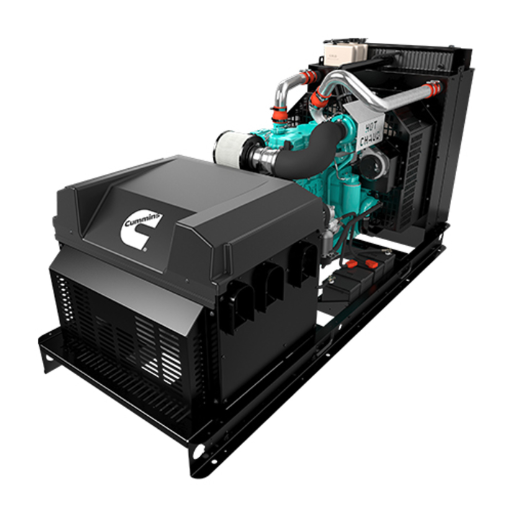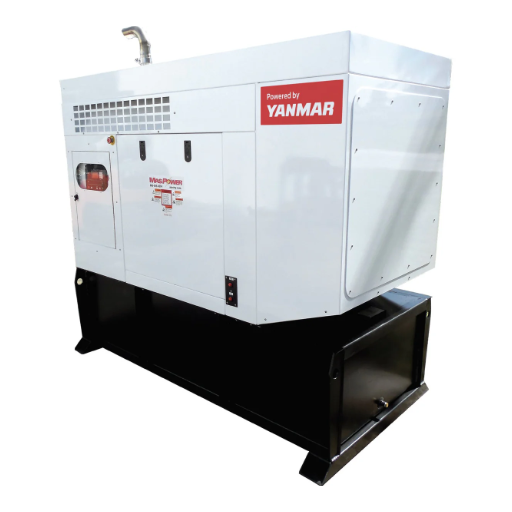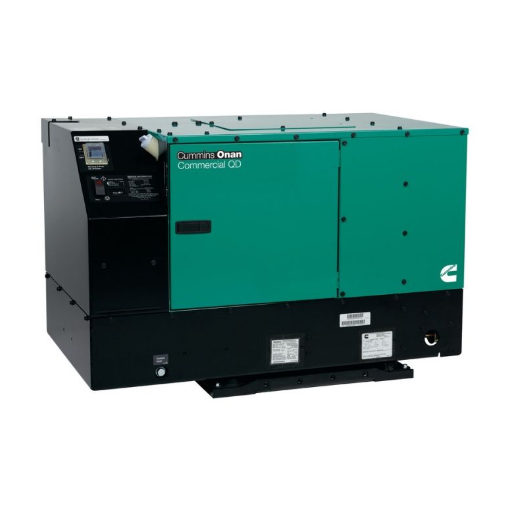Regarding industrial power solutions, selecting the appropriate generator would ensure energy reliability and efficiency for your operations. Diesel and natural gas generators are the most common, each presenting strengths and weaknesses. Choosing between two giants entails assessing various factors: from fuel availability, cost-effectiveness, and environmental considerations, to maintenance from a logistical point of view. This article, therefore, investigates the pros and cons of diesel and natural gas generators so that you will have additional insights to make a well-informed choice that best suits the industrial power needs of your business. With this guide, whichever way you aim to go- whether it is to reduce downtime, cut operational expenses, or via conscious energy sustainability- this guide will bring you the main differences and give you tools to weigh your options properly.
Introduction to Industrial Generators

Industrial generators are power machines that fulfill the purpose of reliable power backup or prime power in an industrial setup. They convert mechanical energy into electrical energy to carry on with uninterrupted operations during power outages or in off-grid locations. Various generators, such as diesel-type and natural gas-type, stand apart in the way of efficiency, availability, and environmental impact. They aim to provide a dependable and uninterrupted power supply to critical industrial processes, machinery, and infrastructure.
Overview of Diesel Generators
Diesel generators provide a strong and efficient source of power generation used across many industries. Some of their key features include high fuel efficiency, ruggedness, and the ability to generate large amounts of power for a long duration. They find more usage in backup power solutions for hospitals, data centers, and construction sites. Modern diesel generators have been capable of complying with environmental standards to some extent, with reduced emissions and noise. Their dependable nature and simple maintenance have made them more appropriate for critical and remote operations. Industries are also utilizing these from a diesel perspective to deploy hybrid power arrangements in conjunction with renewable energy systems to realize more power supply efficiency and reduce carbon footprint.
Overview of Natural Gas Generators
Since natural gas generators are efficient and environment-friendly, they can be considered for energy requirements, whether at home or for industry. They burn natural gas, cleaner than diesel or gasoline, with fewer greenhouse gas emissions. Being cheaper in many parts of the world and readily available, natural gas ensures a reliable energy source. New-generation natural gas generators are designed to be ultra-efficient, featuring fully automated controls and intelligent monitoring systems. Their quieter operation and lower maintenance make them more attractive in areas where noise or operational downtime are of concern.
Importance of Choosing the Right Generator
The selection of a generator is one of the defining factors for energy reliability, cost efficiency, and long-haul sustainability. Depending on capacity, use arises from backup, residential, or industrial power. Data from the U.S. Energy Information Administration (EIA) suggests that standby generators have become increasingly significant in recent times as power outages have increased due to extreme weather events. From 2000 to 2020, the average outage duration nearly doubled in the U.S., creating an enormous demand for reliable backup power.
When choosing a generator, factors that need consideration include fuel type, power output, efficiency, and environmental effects. Natural gas generators emit around 50-60% less CO2 than coal power plants, thereby a greener choice, according to the Environmental Protection Agency (EPA). There are also other technological advances; for example, inverter generators have improved fuel efficiency, decreased noise levels, and are ideal for residential and small business applications.
Besides these, large-scale industrial companies often require high-capacity generators to supply continuous power; these generators are usually equipped with intelligent monitoring systems and automated load management to optimize performance further and minimize downtime. Industry research suggests that energy-efficient generator investments can save a business 15-20% annually in operational costs, emphasizing the financial aspect of brilliant selection.
Hence, proper generator selection weds immediate concerns with longer-term objectives of sustainability, cost-efficiency, and the latest developments in generator technologies.
Efficiency Comparisons

Fuel type is one of the prime factors considered while comparing generator efficiencies. Typically, diesel generators have an edge over gasoline generators by consuming less fuel in exchange for longer hours of operation. Natural gas generators might be an option for an electrifying experience since they offer cleaner energy and minimize the carbon footprint, which might concern environmentally-conscious folks. Then come inverter generators, which can vary engine speed by power demand to maximize energy efficiency and reduce fuel consumption. Efficient generators primarily depend on how precisely they meet an operation’s energy demands.
Fuel Efficiency of Diesel Generators
Diesel generators are well-known for their fuel efficiency compared to other types of generators. They expel air under compression to a high temperature, and only then do they allow the fuel inside, ensuring that fuel combustion takes place more efficiently. Modern diesel generators convert roughly 40-50% of thermal energy from fuel into sound electric energy on average and are preferred in situations requiring large-scale or continuous operations. Load, upkeep procedures, and the size of generators considerably influence fuel efficiency. Proper maintenance and operation under an optimized load greatly benefit the user with regard to performance and fuel consumption.
Fuel Efficiency of Natural Gas Generators
The major advantages associated with natural gas generators are their efficiency and environmental benefits. Normally, they can reach a thermal efficiency of 40-45%; however, advanced systems such as CHP can achieve efficiencies between 80 and 90% when electric power generation and heat recovery are both considered. Thus, they can compete with other energy options offered to industries, commercial establishments, and even residential setups, trying to cut energy costs and environmental footprint.
Natural gas burns cleaner than conventional diesel or coal and produces fewer pollutants, such as nitrogen oxides (NOx), sulfur dioxide (SO2), and particulate matter. So, in a side-by-side comparison based on efficiency, it contributes fewer greenhouse gas emissions than other fossil-fuel options. The U.S. Energy Information Administration (EIA) states that, when burned for power, natural gas may release around 50-60% less CO2 than coal.
In addition, technology improvements, such as lean-burn engines and advanced combustion systems, improve the fuel efficiency of natural gas generators. Engines loaded to optimal levels and frequently maintained perform more reliably, give a good return against maintenance costs, and thus increase a generator’s working life. This mix of cost efficiency, low emissions, and reliable performance has made natural gas generators one of the most in-demand worldwide.
Overall Efficiency: Gas vs. Diesel
While diesel generators are about 20-40% more efficient than natural gas generators, natural gas emissions are cleaner, and the fuel cost is also less.
|
Parameter |
Diesel |
Natural Gas |
|---|---|---|
|
Efficiency |
High (20-40%) |
Moderate |
|
Fuel Cost |
High |
Low |
|
Emissions |
High |
Low |
|
Durability |
High |
Moderate |
|
Maintenance |
Low |
Moderate |
|
Suitability |
High Loads |
Continuous Use |
|
Noise |
High |
Low |
Cost-Effectiveness Analysis

Generally speaking, natural gas generators go down as being the more costly to maintain and fuel in the long run, whereas diesel generators can somewhat go the other way in certain situations wherein they have a lower upfront cost and higher energy efficiency; still, the price of a diesel fuel is most often greater and more volatile than it is for natural gas. Also, the natural gas infrastructure enables users to enjoy consistent and predictable energy costs. Hence, these lower operating costs of gas generators make them a financially attractive option in the long run for several applications.
Initial Costs of Diesel vs. Natural Gas Generators
Diesel generators will have more upfront costs but less installation costs, whereas natural gas generators will cost less upfront but require costly pipeline setups.
|
Parameter |
Diesel |
Natural Gas |
|---|---|---|
|
Upfront Cost |
High |
Moderate |
|
Installation |
Low |
High |
|
Fuel Setup |
On-Site Tank |
Pipeline |
|
Long-Term Cost |
Moderate |
Low |
|
Suitability |
Remote Areas |
Urban Areas |
Operating Costs and Maintenance Needs
Operating costs and maintenance are thus considered a prime factor in deciding between diesel and natural gas generators. Diesel generators require less maintenance due to their simpler engine design and solid construction. But, diesel fuel prices are generally higher and fluctuate with market conditions, leading to possibly less predictable long-term operating expenses. Conversely, natural gas generators have the advantage of cheap and continuously supplied fuel, allowing for steady operational costs. However, natural gas generators may require more maintenance because the fuel tends to burn hotter and cleaner, slowly wearing away their engine components. The choice between the two will depend mainly on the specific application and fuel availability and, more fundamentally, on how the operator weighs reliability versus cost management.
Long-Term Financial Benefits
The nature of long-term financial benefits offered by different types of generators brings into confrontation the diesel versus natural gas dichotomy, since both stand to present advantages. They argue that due to a very high level of fuel efficiency and performance of diesel generators, the total cost of ownership of a diesel generator is usually less for high power outputs or prolonged duration. Less frequent maintenance can further add to these savings. On the other hand, natural gas generators offer financial stability because of the lower, less volatile fuel cost, hence their attraction in any area with a reliable gas infrastructure. Other than that, some technological progress is being made in these generators to increase durability and reduce maintenance costs, enhancing their long-term stature. Thus, when it comes to long-term financial presence, the advantage of natural gas/diesel must be weighed against factors such as fuel availability, load requirement, and hours of operation, in addition to the broad market trends.
Environmental Impact

In contrast to diesel or coal plants, natural gas plants cause less environmental harm. Apart from far fewer greenhouse gases like carbon dioxide, and far fewer air pollutants like sulfur dioxide and particulate matter, natural gas is, however, still a fossil fuel, and its extraction and consumption contribute to methane emissions, which are considered the most powerful greenhouse gas. Thus, shifts towards renewable alternatives would be the ultimate goal in the long run for environmental sustainability.
Emissions from Diesel Generators
Generative diesel engines are ideal for backup power and off-grid power, but the latter dreadful toxifiers find a perfect outlet in these engines. These noxious ovens exude heavy artillery of pollutants ranging from carbon dioxide (CO2) to nitrogen oxides (NOx), particulate matter (PM), and sulfur dioxide (SO2). Until recent data has been collected, it would have informed us that a stationary diesel generator would emit about 2.4 kilograms of CO2 per liter of diesel fuel combusted. Diesel generators, commanding longer hours of emissions generation, have unwittingly become landmarks for increasing greenhouse gas buildup and air pollution in some areas.
Diesel generators, the most excellent sulfur dioxide sources, also contribute considerably to nitrogen oxides (NOx), precursor molecules of ground-level ozone and smog formation. At the same time, their manifestations become a pubic nuisance through a plethora of ill effects on human health, including respiratory and cardiovascular illnesses. Particulate matter formed from diesel exhaust has been classified as a carcinogen by the World Health Organization (WHO). It has been implicated in the causation of lung illnesses and other health-related problems.
According to the World Bank, many countries utilize diesel generators, particularly in regions where the power grid remains unreliable. Nigerian studies revealed that about 40 percent of the country’s electricity is provided by diesel generators, damaging the environment through air pollution.
Stringent regulations, promotion of cleaner technologies, and a faster transition toward renewable energy sources that offer a sustainable and less harmful alternative to power generation can halt the adverse environmental effects caused by diesel generators.
Emissions from Natural Gas Generators
Despite their cleaner image, natural gas generators do exert some environmental impact. Although their level of particulate matter and sulfur dioxide emissions is lower than that of diesel generators, they contribute to air pollution and greenhouse gas emissions. The combustion of natural gas produces about 117 pounds of carbon dioxide (CO2) for each million British thermal units (MMBtu) of energy generated, as recorded by the U.S. Energy Information Administration (EIA).
Although nitrous oxides (NOx) and carbon monoxide (CO) emissions from natural gas generators are much lower than from other fossil fuels, the clandestine nature of methane leaks makes it worse due to substantial emissions from natural gas extraction and transportation. Methane is a greenhouse gas approximately 25 times better at trapping atmospheric heat than CO2 over a 100-year timeframe.
Investment in CCS technologies and power generation efficiency improvements would be a good mitigation for emissions from natural gas and carbon generators. In contrast, renewable energy resources such as wind and solar would actually help reduce the environmental impact of these less-polluting generators.
Reference Sources
- Experimental Investigation to Assess the Performance Characteristics of a Marine Two-Stroke Dual Fuel Engine under Diesel and Natural Gas Mode
- Authors: Theofanis D. Hountalas et al.
- Publication Date: 2023-04-19
- Journal: Energies
- Summary: This paper presents a comparative analysis of a marine two-stroke engine operating on diesel and natural gas. The results show that while both fuels can achieve similar performance levels, natural gas operation leads to lower NOx and particulate matter emissions. The study highlights the efficiency benefits of using natural gas, particularly in marine applications where emissions regulations are becoming increasingly stringent.
- A Hierarchical Optimisation of a Compressed Natural Gas Station for Energy and Fuelling Efficiency under a Demand Response Program
- Authors: C. Kagiri et al.
- Publication Date: 2019-06-06
- Journal: Energies
- Summary: This study investigates the optimization of compressed natural gas (CNG) stations to improve energy and fueling efficiency. The findings suggest that CNG stations can provide significant cost savings and environmental benefits compared to diesel stations, particularly in terms of emissions. The study emphasizes the role of CNG as a viable alternative to diesel in reducing greenhouse gas emissions.
- Investigation on the Heat-to-Power Generation Efficiency of Thermoelectric Generators (TEGs) by Harvesting Waste Heat from a Combustion Engine for Energy Storage
- Authors: P. Ragupathi, D. Barik
- Publication Date: 2023-02-06
- Journal: International Journal of Energy Research
- Summary: This paper explores the efficiency of thermoelectric generators (TEGs) in recovering waste heat from diesel engines. While it does not directly compare natural gas and diesel generators, it highlights the efficiency improvements achieved through waste heat recovery in diesel engines, suggesting that natural gas engines may also benefit from similar technologies.
Frequently Asked Questions (FAQs)
What are the differences between diesel and natural gas generators?
Diesel and natural gas generators differ primarily in their fuel source and emissions. Diesel generators typically use denser diesel fuel, which offers higher energy density than natural gas. In contrast, natural gas generators operate on natural gas, which emits lower emissions and is often considered a cleaner alternative. Diesel generators are known for their reliability and longer run times, while natural gas generators are favored for their lower operational costs and reduced environmental impact.
What are the pros and cons of diesel generators?
Diesel generators have pros, including durability, higher peak energy density, and longer lifespan compared to natural gas generators. They can operate in various environments and are often the preferred choice for industrial applications. However, the cons of diesel include higher emissions, noise levels, and dependence on diesel fuel, which can be more expensive than natural gas in some regions. Additionally, diesel engines require regular maintenance to ensure optimal performance.
Are natural gas generators more efficient than diesel generators?
Natural gas generators are often considered more efficient in fuel consumption and emissions. They typically produce fewer greenhouse gases and particulate matter, making them a more environmentally friendly option. However, the overall efficiency can depend on various factors, including the specific application and the type of generator set used. Natural gas generators can provide a cost-effective solution with lower operational costs in standby power applications.
What are the cons of natural gas generators?
While natural gas generators have many advantages, there are also cons to consider. They often require a reliable gas line or pipelines for operation, which can limit their installation options. Additionally, natural gas is less energy-dense than diesel, potentially requiring larger storage solutions for the same power output. Safety concerns related to gas leaks can also exist, making proper installation and maintenance crucial.
How do I find the right generator for my needs?
Finding the right generator involves assessing your power requirements, fuel preferences, and application. Consider whether you need backup or a primary power source, and evaluate the pros and cons of diesel versus natural gas. Factors such as the availability of fuel sources, installation costs, and maintenance requirements should also be considered. Consulting with a generator service provider can help you determine the best power solution.
What is the impact of fuel source on efficiency?
The fuel source significantly impacts generator efficiency. Diesel fuel generally provides higher energy density, allowing diesel generators to produce more power with less fuel. On the other hand, natural gas emits lower emissions and can be more cost-effective in certain regions. The choice between diesel and natural gas can influence not only operational efficiency but also long-term fuel costs and environmental impact.
What should I consider when installing a diesel generator?
Consider location, fuel availability, and capacity when installing a diesel generator. Proper ventilation is essential to reduce emissions and noise. Regular generator maintenance should also be planned to keep the unit operating efficiently. It’s also important to check local regulations regarding emissions and noise levels to ensure compliance.
How does a natural gas generator compare to diesel in terms of emissions?
Natural gas generators typically produce significantly lower emissions compared to diesel generators. They emit fewer greenhouse gases and particulates, making them a more environmentally friendly choice. This reduced environmental impact is one of the primary reasons many industries are shifting towards natural gas for their power generators. However, the overall emissions can also depend on the specific generator model’s efficiency and the fuel quality used.
